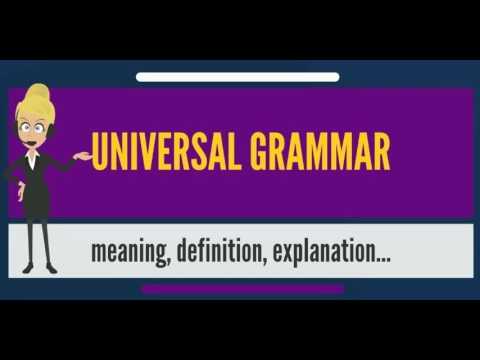The Audiopedia
✪✪✪✪✪ WORK FROM HOME! Looking for WORKERS for simple Internet data entry JOBS. $15-20 per hour. SIGN UP here – http://jobs.theaudiopedia.com ✪✪✪✪✪
✪✪✪✪✪ The Audiopedia Android application, INSTALL NOW – https://play.google.com/store/apps/details?id=com.wTheAudiopedia_8069473 ✪✪✪✪✪
What is UNIVERSAL GRAMMAR? What does UNIVERSAL GRAMMAR mean? UNIVERSAL GRAMMAR meaning – UNIVERSAL GRAMMAR definition – UNIVERSAL GRAMMAR explanation.
Source: Wikipedia.org article, adapted under https://creativecommons.org/licenses/by-sa/3.0/ license.
Universal grammar (UG) is a theory in linguistics, usually credited to Noam Chomsky, proposing that the ability to learn grammar is hard-wired into the brain. It is sometimes known as “mental grammar”, and stands opposed to other “grammars”, e.g. prescriptive, descriptive and pedagogical. The theory suggests that linguistic ability becomes manifest without being taught (see the poverty of the stimulus argument), and that there are properties that all natural human languages share. It is a matter of observation and experimentation to determine precisely what abilities are innate and what properties are shared by all languages.
The theory of universal grammar proposes that if human beings are brought up under normal conditions (not those of extreme sensory deprivation), then they will always develop language with certain properties (e.g., distinguishing nouns from verbs, or distinguishing function words from lexical words). The theory proposes that there is an innate, genetically determined language faculty that knows these rules, making it easier and faster for children to learn to speak than it otherwise would be. This faculty does not know the vocabulary of any particular language (so words and their meanings must be learned), and there remain several parameters which can vary freely among languages (such as whether adjectives come before or after nouns) which must also be learned.
As Chomsky puts it, “Evidently, development of language in the individual must involve three factors: (1) genetic endowment, which sets limits on the attainable languages, thereby making language acquisition possible; (2) external data, converted to the experience that selects one or another language within a narrow range; (3) principles not specific to the Faculty of Language.”
Occasionally, aspects of universal grammar seem describable in terms of general details regarding cognition. For example, if a predisposition to categorize events and objects as different classes of things is part of human cognition, and directly results in nouns and verbs showing up in all languages, then it could be assumed that rather than this aspect of universal grammar being specific to language, it is more generally a part of human cognition. To distinguish properties of languages that can be traced to other facts regarding cognition from properties of languages that cannot, the abbreviation UG* can be used. UG is the term often used by Chomsky for those aspects of the human brain which cause language to be the way that it is (i.e. are universal grammar in the sense used here) but here for discussion, it is used for those aspects which are furthermore specific to language (thus UG, as Chomsky uses it, is just an abbreviation for universal grammar, but UG* as used here is a subset of universal grammar).
In the same article, Chomsky casts the theme of a larger research program in terms of the following question: “How little can be attributed to UG while still accounting for the variety of ‘I-languages’ attained, relying on third factor principles?” (I-languages meaning internal languages, the brain states that correspond to knowing how to speak and understand a particular language, and third factor principles meaning (3) in the previous quote).
Chomsky has speculated that UG might be extremely simple and abstract, for example only a mechanism for combining symbols in a particular way, which he calls “merge”. The following quote shows that Chomsky does not use the term “UG” in the narrow sense UG* suggested above:
“The conclusion that merge falls within UG holds whether such recursive generation is unique to FL (faculty of language) or is appropriated from other systems.” .




can't really learn from a montoned character
Thanks